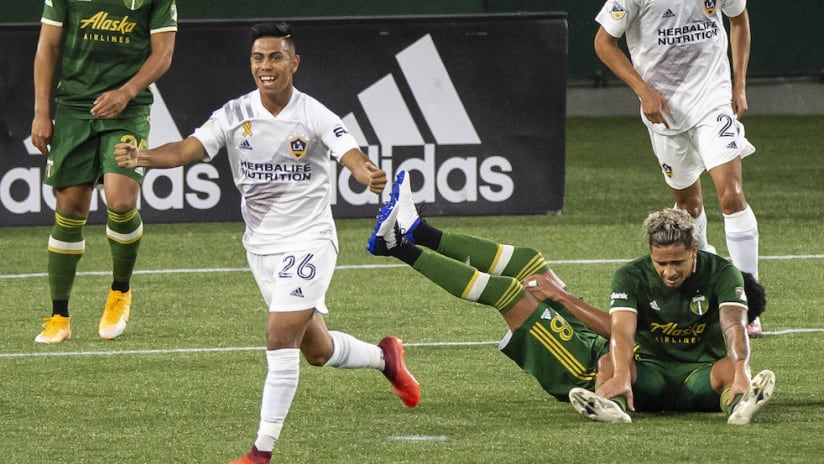After a year’s delay imposed by COVID-19, the United States under-23 men’s national team is finally on the verge of kicking off its Olympic adventure in earnest.
Concacaf holds its Olympic qualifying tournament in Guadalajara next month, and on Monday US head coach Jason Kreis and his staff will kick off a two-and-a-half-week preparation camp on site in the Mexican city.
The confederation released the eight participating nations’ preliminary rosters on Tuesday morning, lists of up to 50 players per country from which the final 20-man squads must be selected 10 days before the tournament starts. Two dual-nationals immediately prompted conversation in the MLS context -- one who is on both of his countries’ lists, and one on neither’s.
LA Galaxy homegrown Efra Alvarez has been named to both the US and Mexico prelim rosters, a rarity in these situations, while Toronto FC striker Ayo Akinola was left off both the Canada and US lists. Kreis addressed both scenarios in a conversation with MLSsoccer.com.
“Ayo is a player that is having some health issues, and that's why he was not listed in our group. So we believe that he's unable to train or play right now,” said the coach, declining to provide further detail about the specifics Akinola is dealing with.
Watch: Ayo Akinola scores on his USMNT debut vs. El Salvador in December
The US-Canadian-Nigerian attacker also missed out on Canada’s January camp with an undisclosed injury and was reportedly unable to train fully in the opening days of TFC’s preseason, which kicked off in Toronto on Feb. 18. Akinola has represented the United States at youth international level but multiple reports have suggested that he’s considering his options after a sustained recruiting push by Les Rouges.
Meanwhile Alvarez has most recently represented Mexico in youth competition but was invited to the USMNT’s December camp and is clearly a high-priority target for Kreis and senior-squad coach Gregg Berhalter. The 18-year-old playmaker would have to file a one-time switch to represent the US in Olympic action, which would permanently cap-tie him to the country of his birth.
“Efra’s a player that we worked with in December, and to be frank with you, I hadn't seen a whole lot of Efra, because I don't think he’s really been a regular, consistent performer in MLS. And so to work with him for a week and see him in and around the rest of the full national team players was eye-opening,” said Kreis.
“Gregg and I both feel this is a player that has some potential, and some tools that arguably nobody else in the national team pool has. And so he becomes very, very interesting for us,” he continued. “And so we want to afford him the opportunity to be a part of our national teams program going forward. Now having said that, we want to let him know that, but then we need to step back and say, this is a very personal decision for somebody, and so we don't mean to put any undue pressure on you. We just want to let you know how highly we regard you, how highly we think your potential could be in our program. So the decision is left to Efra, but there will be no pressure put on him from the US men’s national team perspective.”
The preliminary US list also included seven players based overseas, including the likes of Brenden Aaronson and Bryan Reynolds, which raises some eyebrows given the historical difficulties in convincing foreign clubs to release players for Olympic competition, which falls outside of FIFA’s mandatory release protocols.
Kreis said conversations with clubs are “ongoing” and that he and USMNT general manager Brian McBride contacted those clubs abroad “extremely early” in order to give everyone involved lots of time to mull their decisions and react to others’. He calls himself an “optimist” when it comes to his hopes of getting some good news on that front, but doesn’t consider it a key factor in the team’s hopes of breaking the program’s 12-year Olympic qualification drought.
“I’m always going to be hopeful that we get more yeses than noes,” he said, “but I also would be pragmatic enough -- and I think a good coach’s characteristic is to be a realist and to say, even without a lot of yeses, I still think that this group and this pool will be very capable of qualifying ourselves for the Olympics.”
The US U-23s will open Group A play against Costa Rica at Estadio Jalisco on March 18, then face the Dominican Republic on March 21 at Estadio Akron before concluding group play against Mexico on March 24. The top two finishers from Group A and Group B advance to the semifinal round, and the two sides who win those matches will represent the region at the Summer Games in Tokyo.













